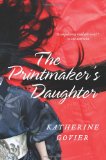Summary | Excerpt | Reviews | Beyond the Book | Readalikes | Genres & Themes | Author Bio

 Book Reviewed by:
Book Reviewed by:
Mark James
Buy This Book
And my black eyes did not close.
In years to come he did call me Ago-Ago, when he remembered, but most often he just called me.
"Hey, you. Come here!"
I was born in a hard time.
We the townspeople led an unmarked existence. We had rights to nothing, only to witness the grand shogun's parade: the march of the doomed man to the Punishment Grounds, details of his crime painted on the placard he carried over his shoulder. We fed on brown rice and whispers of love suicides. The mouths of our actors were red gashes. We, the chonin, had one name - and no face.
In the years before my birth there was an artist called Sharaku. He made gargantuan faces with vast white, empty centers marked only with deep black lines for eyes and mouths spread in rage or fear or greed. But few people bought these pictures - they came too close to home, I think - and before long Sharaku and his work disappeared. Some people said he was a Noh actor and died of poisoning from the white face makeup. Other people said Sharaku was my father. They said that after this first failure he renamed himself and went on, and the proof that he had been Sharaku was that he never painted a big face again.
I don't know if that was true. My father told me much, but not that.
It was true about the faces, though: my father could draw anything that moved and much that didn't - dancers, elephants, oarsmen, mountains, gods, and devils. Waterfalls and waves stopped for his brush. Fuji showed its one hundred moods. But he never made a face. Eyes, nose, and mouth - for him these were only a few short, sharp lines, and that was it. Maybe the gossip was true and he thought faces wouldn't sell. Maybe he wanted distance from his past. Maybe he wanted distance from us all. Henceforth, to him, we had no faces, only burdened backs and sinewed buttocks, slim thighs and crinkled toes and dancing torsos.
Oh, but such bodies we had. Such glories were in them. They were our prized possessions. By these bodies, we were making ourselves into people. Before I was born we were not quite human, according to our masters. The bakufu - a tent government set up on a field of war two hundred years before - kept the Tokugawa shogun in power. But as the eras passed, the bakufu remained. There were no wars; we didn't fight with swords. We fought with words and pictures. Our pictures and our little storybooks cost pennies. But they had a strange power. They gave us news, gossip, celebrity, mementos. They celebrated the only pleasures we were allowed - Kabuki theater and love affairs and the small indulgences for our bodies.
The Tokugawa could not attack us directly; there were too many of us. Instead the enforcers attacked the messengers, our pictures; they called them decadent and tried to destroy them.
Think of all that clanking samurai power directed at these fragile sheets of paper. I want to laugh. Pictures and words don't hurt anyone, except for those who are afraid of history. The bakufu aimed their laws at our insubstantial world. There were to be no pictures of the Tokugawa. Any reference to how they came to rule was punishable by death. Famine and flood might ravage the country, but to note such calamities would be a criticism of the shogun, who ruled celestial events as he did lesser beings. Therefore they were not to be acknowledged.
We appeared to obey. We told ghost stories and repeated legends from times past, and went to plays about the love affairs of great courtesans. We put our faith in unnatural creatures - demons and gods and ghosts. Our gossip traveled through whispers and pulpy yellow-back novels. We sang and danced and devised outrageous dress. The bakufu bogeymen uttered ordinances and staged clampdowns. They did not stop us, but they kept trying. They were a constant backdrop to my life, from my first squalling through my middle years until I was almost old enough not to care. Then, suddenly, they were gone. But that comes at the end of the story.
Excerpted from The Printmaker's Daughter by Katherine Govier. Copyright © 2011 by Katherine Govier. Excerpted by permission of Harper Perennial. All rights reserved. No part of this excerpt may be reproduced or reprinted without permission in writing from the publisher.





The Funeral Cryer by Wenyan Lu
Debut novelist Wenyan Lu brings us this witty yet profound story about one woman's midlife reawakening in contemporary rural China.
Your guide toexceptional books
BookBrowse seeks out and recommends the best in contemporary fiction and nonfiction—books that not only engage and entertain but also deepen our understanding of ourselves and the world around us.